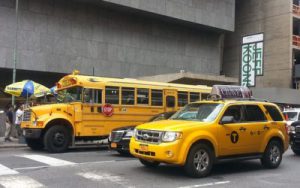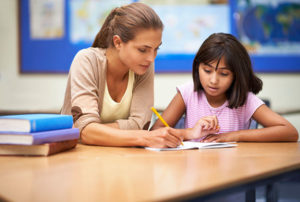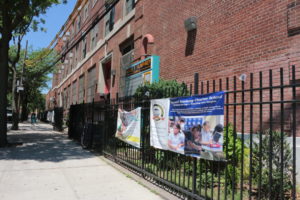Guide to choosing a French or bilingual school in New York City
Deciding where your children will be attending school should be one of the first decision you make when starting your expatriation journey.
 First Step? Your Children’s Education
First Step? Your Children’s Education
Expatriation is always an exciting time, but it comes with its own set of difficult decisions. If you are considering moving to New York, you are probably looking forward to strolling through the shiny skyscrapers of Manhattan or exploring the hip boutiques of Brooklyn. However, beyond the distances and the obvious changes in lifestyles, families face an additional challenge. Whether they are considering living abroad at short or long-term, the question of the children’s education is often a tricky one. Many kids arrive in the United States with very little knowledge of the English language, which can make the transition into their new education system difficult. Besides, if the family is considering moving back to France after its expatriation, or if their children would like to pursue their higher education in the French system – significantly cheaper than its American counterpart – maintaining an education in French during their time abroad is a significant part of preparing their reentry in the country. These factors lead many parents into opting for an education based at least partially on the French system while living abroad. If this is the decision you are leaning toward, this guide should help you decide what the best option is for your family. We will explore the differences between establishments offering an instruction leaning heavily towards the French model, like the Lycée Français, versus the bilingual programs offered by public schools like the Carroll School (P.S. 58), and how this decision could affect where you live.
French and American education systems have significant discrepancies in terms of curriculum and organization, but also regarding their teaching philosophies. While the French system focuses primarily on academia, the American one gives considerable importance to classes that are considered secondary in France, like arts or sports. Besides, standardized tests, like the Diplȏme National du Brevet at the end of Middle school or the Baccalauréat, that sesame to higher education in France, have no equivalent in the American system. American students are also free to choose which classes to attend beyond compulsory courses in Sciences, Mathematics, and English and Social Sciences. This customized curriculum would be unthinkable in France.
These differences can make getting back into the French system difficult for a student in the traditional American system. Thankfully, NYC includes several schools, located throughout New York City and New Jersey, accredited by the French Ministry of Education that offer an education similar to the one received by pupils in French public schools, making the transition back to their home country as seamless as possible. In addition, several public schools in Brooklyn and Manhattan provide interested students of all backgrounds with a bilingual French-English language program free of charge, where several subjects such as Mathematics, Science or History are taught in French. Finally, some independent private schools, most of them serving younger preschool-aged children, offer an instruction either partially or entirely in French but are not accredited by the French Ministry of Education.
 Accredited school or dual-language program?
Accredited school or dual-language program?
Deciding whether to sign up your child in an independent school fully or partially accredited by the French Ministry of Education, or in a public school offering a French bilingual program is a choice that could affect your entire lifestyle.
For many, it is first and foremost a financial decision. One of the most significant differences between accredited schools and bilingual programs is the cost: independent schools are expensive especially in New York, with tuition reaching upward to over $40,000 per year per student. It is a significant investment, especially if the family includes more than one child of school age who will pursue most of his or her education in the United States. These accredited schools often offer tuition assistance to help alleviate the costs, but scholarships are extremely competitive. Besides, children who are claiming French nationality and who are registered at the French General Consulate in New York may also be eligible to a French National Scholarship (also known as Bourses Scolaires) to attend one of the schools accredited by the Agence pour l’Enseignement Français à l’Etranger (AEFE). The French government’s tuition assistance program only covers part of the tuition fees and depends on the size of the family, the school the children are enrolled in, and the household’s assets and income. If you are interested and might be eligible for financial aid, you should apply directly to the Consulate.
Besides the financial considerations, independent schools are often very selective, leading to challenging entry tests and extensive waiting lists. However, if you only intend to live in New York for a relatively short time and are planning for your children to get back into the French education system within a few years, investing in your children’s education in an accredited school is worth it. It could make your re-entry into your home country a lot easier since your child will follow a very similar program to the one he or she would have receive if you had stayed in France.
On the other hand, bilingual programs offered in the public schools of Brooklyn or Manhattan are free. However, they come with residency restrictions, which means that you need to live in a specific area for your child to be eligible to attend. If you are considering renting or buying an apartment in New York during your expatriation, you should keep in mind which school district the property will belong to if you would like for your child to take advantage of this free education while maintaining a high-quality education in French like the one offered by P.S.58 (aka Carroll School). New York real estate market being notoriously tricky to navigate, especially for a foreigner, we strongly recommend that you work with a real estate agent familiar with the city. It should be noted that the French Ministry of Education does not accredit these programs and that they typically follow the New York State curriculum and the NYC school calendar. However, if you are considering establishing yourself on the long-term in the United States, they constitute an excellent bridge between French and American culture, allowing pupils to maintain a strong linguistic and cultural link with their home country while being immersed in this new experience.
 French schools and bilingual programs in Manhattan
French schools and bilingual programs in Manhattan
The Lycée Français de New York is one of the powerhouses when it comes to French education in New York and is fully accredited by the French Ministry of Education. Founded in 1935, it is one of the oldest schools of such kind, and one of the largest with nearly 35,000 students and graduates. It serves students of all ages, from pre-Kindergarten to 12th grade. The admission process is highly competitive and starts a year before the new school year. Students in Nursery school and Pre-Kindergarten are not required to speak French, but older students starting in Kindergarten should speak the language. Students starting in grade school are considered based on their school record. Students that were not enrolled in a school accredited by the French Ministry of Education must take an entrance exam in French, math, and, depending on the grade level, other subjects. The Lycée offers an authentically international experience to its students, with one-third of the children enrolled being French nationals, one third being Americans, and the remaining from different countries around the world. In addition to the Baccalauréat, students are also prepared for American college preparatory classes and tests like the SAT and AP exams should they plan on pursuing their higher education in the United States. French as a language of instruction varies depending on the grade level, from 50% in preschool to 80% in Primary school and anywhere between 40% and 40% after 6th grade depending on the child’s area of interest and where she or he will likely attend college and university.
In addition to the Lycée Français, students can also attend other institutions that are also accredited by the French Ministry of Education. The Ecole Internationale de New York serves students from Nursery to 8th grade. The United Nations International School, who enrolls primarily students issued from families working for the United Nations, is only accredited by the AEFE for students enrolled from 2nd to 5th grade while the Lyceum Kennedy is accredited from Nursery through 9th grade, although they do offer classes through 12th grade.
Besides those accredited schools, the Lillian Weber School of the Arts offers a bilingual program for children attending pre-kindergarten to 5th grade. It is primarily a neighborhood school and children living in the school district are guaranteed admission, although those living anywhere in Districts 3 may apply. Native French speakers residing outside of the school district are sometimes admitted based on the waitlist. The New York French American Charter School admits children enrolling from pre-kindergarten to 7th grade through a lottery-based admissions process. Those that are not accepted are welcome to join the waiting list for spaces that may become available in the future.
French school and bilingual programs in Brooklyn
The International School of Brooklyn (ISB) is the only school accredited by the French Ministry of Education in Brooklyn for students enrolled in Nursery school through 6th grade, although the school serves children up to 8th grade. Children of all language abilities are considered in Pre-K and Kindergarten. However, children entering 1st grade and up to 5th grade should be able to speak, read, and write at grade level in French to be eligible. If your children only speak French, they can be accommodated at all grade levels. Admission to the ISB is made based on the student’s school records for the previous and current school year as well as teachers’ recommendation for children enrolling in 1st grade and beyond. The ISB offers a similar program for Spanish speakers.
Brooklyn is also home to several bilingual French programs. The Carroll School or P.S. 58 serves children from Pre-Kindergarten to 5th grade, with the Dual language French/English program starting in Kindergarten. To attend the school, children must be residents of the Carroll Garden neighborhood. Due to the high demand within the community, the school is not able to accommodate students living outside of the district even for French-speaking prospective students applying to the French Dual language program. Cobble Hill, another Brooklyn neighborhood just north of Carroll Gardens, is not included in the P.S. 58 school district. If you would like for your child to attend a zoned school like Carroll School, we strongly advise that you work with a real estate agent familiar with the subtleties of the New York school district when choosing a place to live.
However, Brooklyn residents, from Carroll Garden and beyond, can apply to the Boerum Hill School for International Studies who serves students enrolling in 6th to 12th grade and also offers a French dual language program. Boerum Hill welcomes middle schoolers and high schoolers with French language proficiency ranging from beginners to advanced. It is the only high school in Brooklyn that allows students to pursue an education in French beyond Middle School. Other Brooklyn public schools offering a French dual language program include the Clinton Hill school (Pre-K to 5th Grade), the Monitor School (Kindergarten to 5th Grade), the William Butler School (Kindergarten to 5th Grade), and the William Alexander Middle School (6th to 8th Grade).
Deciding where your children will be attending school should be one of the first decision you make when starting your expatriation journey. Not only is the admission process into most schools lengthy, starting up to a year before the school year with strict application deadlines, but where you will live also determines your child’s eligibility to attend some of the bilingual programs offered by the public schools like Carroll School. NYC offers many opportunities in terms of location and programs which could fit your lifestyle and your priorities. The de Tilly Real Estate Group is happy to answer any questions you may have regarding the education choices and the neighborhood themselves to help you determine the best fit for your family and help you find the perfect home for you in New York. Don’t hesitate to get in touch with us today to prepare your expatriation journey.
 Accredited school or dual-language program?
Accredited school or dual-language program? French schools and bilingual programs in Manhattan
French schools and bilingual programs in Manhattan